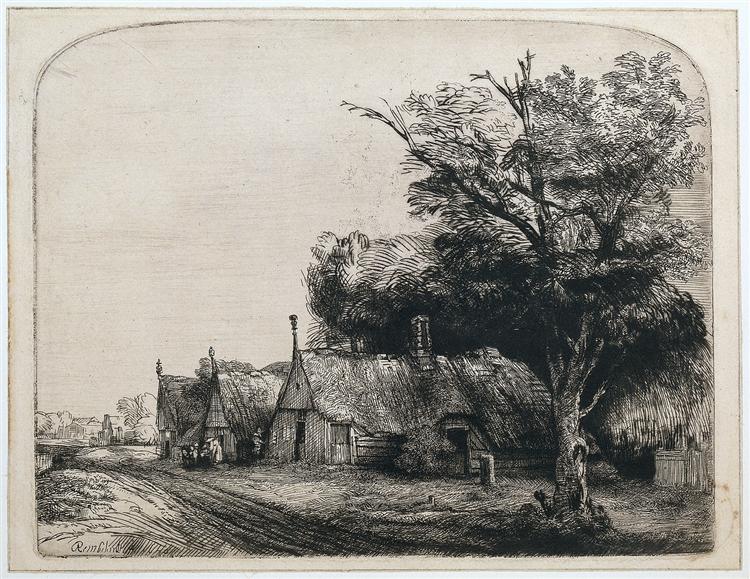Opis
Rembrandt's Landscape with Three Cottages (1650) stands as a striking example of his ability to merge nature with rural life in a poetic and melancholic manner. In this painting, the viewer is greeted by an immense open-air landscape, where three rustic-style cottages emerge modestly against a backdrop of vast, cloudy skies. The choice of such a serene landscape, where nature is intertwined with the simple architecture of the countryside, highlights Rembrandt's mastery not only in the portrayal of the human figure, but also in the depiction of the environment that surrounds it.
The composition is organized around an imaginary triangle that links the three cabins, establishing a balance that nevertheless feels dynamic. Each cabin, rich in textures, is painted with an approach that highlights its rusticity and the nature of the material from which they were built. Rembrandt skillfully employs the contrast of light and shadow, creating an intimate and welcoming atmosphere that invites contemplation. The light seems to filter in softly, illuminating the cabins and accentuating their character. Earthy tones predominate, with shades of brown and green that underline the connection between humans and the earth.
Although the presence of human figures is subtle, there is a palpable sense of life in this landscape. Small silhouettes are perceived in the distance, suggesting the existence of people and their interaction with the rural environment. This approach by Rembrandt brings the viewer closer to a more universal experience with nature and home, evoking a sense of belonging. As in other landscape works of his time, the inclusion of small human figures is not just a detail, but a reflection on man’s place within the dramatically large and often hostile landscape.
This work also reminds us how Rembrandt, despite his fame as a portraitist and master of the use of chiaroscuro, also explored the natural landscape as a space for emotional storytelling. Often, his landscapes could be interpreted as reflections of his own psychological state, and “Landscape with Three Cottages” could be seen as a longing for peace and simplicity in an increasingly complex world. The sky elements, which dominate the upper part of the work, evoke a range of emotions: the grandeur of nature contrasts with the fragility of human existence.
Although not much specific information is available about this particular painting, it is representative of the evolution of landscape in 17th-century Dutch art, where artists such as Rembrandt began to focus on nature as a valid subject worthy of exploration. His work in this field, although less well-known than his portraits, is fundamental to understanding his diversity as a creator. Through "Landscape with Three Cottages," Rembrandt offers us a window into a world where man and nature coexist, a perennial theme that continues to resonate today, inevitably reminding us of the intimate relationship we have with our environment and the importance of finding refuge in the simplicity of the everyday.
KUADROS ©, a famous painting on your wall.
Hand-made oil painting reproductions, with the quality of professional artists and the distinctive seal of KUADROS ©.
Painting reproduction service with satisfaction guarantee. If you are not completely satisfied with the replica of your painting, we will refund 100% of your money.

